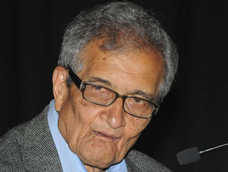
NEW DELHI - Asserting intolerance should not be tolerated, renowned economist and Nobel laureate Amartya Sen said that silencing of dissent and generating fear in the minds of people makes it much harder to have a dialogue-based democratic society. "India is being turned intolerant. We have been much too tolerant with the intolerance. This has to end. So what should we do as citizens of India to support freedom and liberty?

We should not tolerate the intolerance that undermines our democracy," he said, delivering the annual Rajendra Mathur Memorial lecture organised by the Editors Guild of India here on the topic of “The Right to Dissent” here on Tuesday, He said that while the constitution did not have anything against anyone eating beef, or storing it in the refrigerator, some “small but organised groups” were trying to impose their “norms of behaviour that the group wants to propagate” on others in the garb of hurt sentiments. “The realm of delicate sentiments seeks to extend amazingly far. They are eating at their home and your sentiments are being hurt at your home,” Sen said sarcastically. Sen called to examine the colonial era laws which, according to him, served the colonial purpose of reinforce divisions, but perhaps had no place in democracy. In this context, he mentioned section 295A, or deliberate and malicious acts, intended to outrage religious feelings of any class by insulting its religion or religious beliefs, of the Indian Penal Code.
"One aspect of this law is that the British rulers did not want any kind of tension coming from any group that felt insulted. The second and negative aspect is that it emphasised the colonial divisions within India in a dramatic way,” he said. While he observed that India has a long and deeply etched tradition of tolerance, there has always been a streak of intolerance, and the government's complicity in that. “This did not start with the present government,” he said, mentioning the how M.F. Husain did not get any government support when he was hounded out of India and how India became the first country to ban Salman Rushdie's “Satanic Verses”. Sen opined that people should be more vocal, and that the courts need to be more proactive, about protecting the fundamental rights of the citizens, including the right to speech and right to personal liberty that encompasses the choice of what to eat.
"One aspect of this law is that the British rulers did not want any kind of tension coming from any group that felt insulted. The second and negative aspect is that it emphasised the colonial divisions within India in a dramatic way,” he said. While he observed that India has a long and deeply etched tradition of tolerance, there has always been a streak of intolerance, and the government's complicity in that. “This did not start with the present government,” he said, mentioning the how M.F. Husain did not get any government support when he was hounded out of India and how India became the first country to ban Salman Rushdie's “Satanic Verses”. Sen opined that people should be more vocal, and that the courts need to be more proactive, about protecting the fundamental rights of the citizens, including the right to speech and right to personal liberty that encompasses the choice of what to eat.

 RSS Feed
RSS Feed
